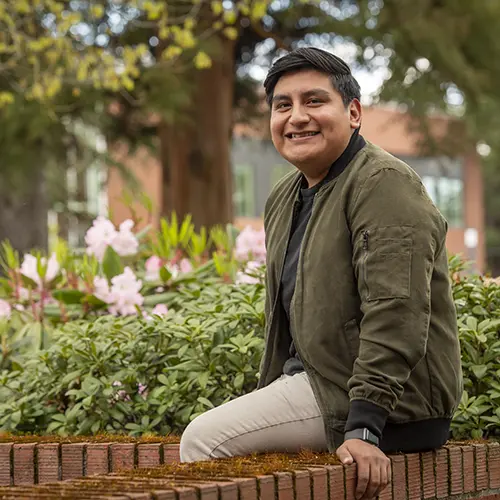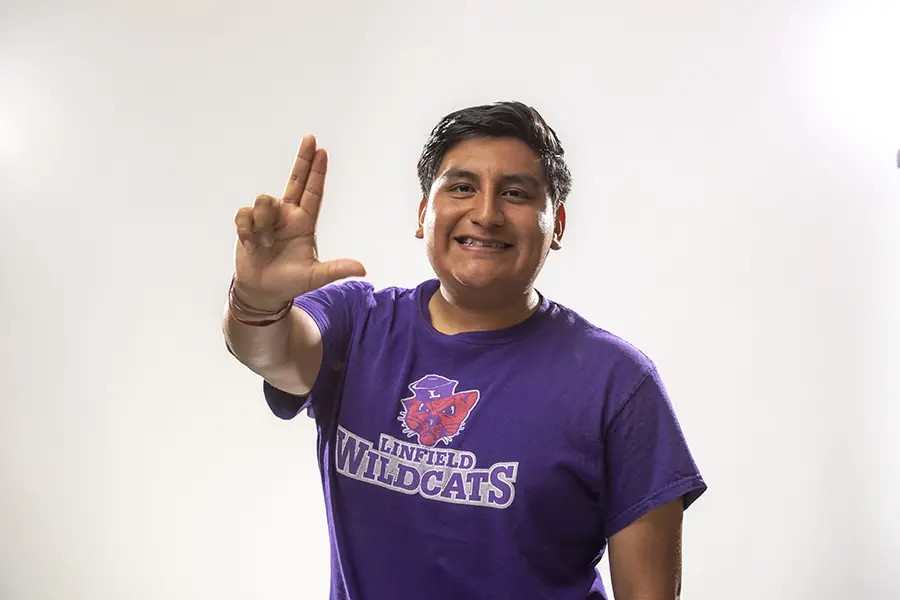
Meet Iván Galicia Sixto ’24
Earning a Fulbright to Teach in Peru


Meet Iván Galicia Sixto ’24

Iván Galicia Sixto ’24 has received a Fulbright award from the U.S. Department of State. Thousands of applications are received from all over the United States for the teaching and research positions supported by these awards in 123 countries around the world. As a Fulbright English Teaching Assistant, he will work with Peruvian students whose first language might not be Spanish but rather Quechua or other indigenous languages.
Iván, a double major in Spanish and secondary education, was born in Woodburn. But when he was young, he and his mother returned to their native town in Oaxaca after a family tragedy.
In his Fulbright application, he wrote, “I was only seven years old when I moved to rural Mexico in the state of Oaxaca. I went to school while also working with my parents in the cornfields where I learned the value of honorable and diligent work. Though I enjoyed my childhood and early teenage years there, I knew I would have to return to my country of birth. Hence, at fifteen, I bravely (or perhaps naively) decided to leave my family to pursue my education in the U.S.”
Although he loved school and was taking multiple advanced courses, his life was shaken by the deportation of his uncle and subsequent loss of housing. His best friend’s parents agreed to take him in shortly before the pandemic began his senior year.
“High school was the hardest chapter of my life, but I found support not only through friends but through my teachers at Woodburn High School,” he said. School, he said, provided him not only safety but also a calling.
“I taught English to migrant students from Guatemala, and I noticed that they needed help even with learning Spanish, as they were speakers of an indigenous language … I prepared lessons to aid the acquisition of basic vocabulary as a form of survival,” he wrote. “I realized I had positively influenced their progress when I walked through the hallway and they called me 'maestro' – teacher, a word that shaped the career I wanted to pursue.”
When he arrived at Linfield, he said, he finally didn’t have to worry about basic survival.
 “When I moved into Linfield, I just felt like it was home. It felt like a place I could thrive, where I had the resources I needed. I could go to the cafeteria and get the food I needed. I could shower because I had a shower. I had my own bed, I had a desk and a chair where I could focus on my homework. Having wifi, that’s a luxury to me,” he said. “Those very simple things meant that I had stability in my life. I was ready to start this new journey.”
“When I moved into Linfield, I just felt like it was home. It felt like a place I could thrive, where I had the resources I needed. I could go to the cafeteria and get the food I needed. I could shower because I had a shower. I had my own bed, I had a desk and a chair where I could focus on my homework. Having wifi, that’s a luxury to me,” he said. “Those very simple things meant that I had stability in my life. I was ready to start this new journey.”
At Linfield, he continued to excel: he was coordinator of LULA, a Ford Family Foundation Scholar, a Dell Scholar, a Mente Summit volunteer and organizer and more. He has worked for the Office of Admissions, as a teaching assistant for the Spanish Department, a field organizer for Pineros and United Peasants of the Northwest (PCUN) and is now a student teacher at McMinnville High School.
“Now that I’m in the classroom, I see myself — that was me, that quiet kid who was in the corner, and now out of nowhere I’m in front of the classroom speaking,” he said. “I see lots of them being shy, and I was the same way, I didn’t ask questions at all. But I hope I am able to offer some inspiration.”
One regret, he said, is not learning Mixtec, his parents’ first language. There is a stigma in Mexico, he said, for speaking indigenous languages instead of Spanish. When he was young, he was ashamed of it, and didn't learn.
When he gets to Peru, he said, he hopes he can help students see the power and beauty in their ancestral languages.
“It’s a superpower to know an indigenous language,” he said. “I would tell them they should not view their language as a limitation but a powerful tool, something that helps them know who they are and where they came from.”